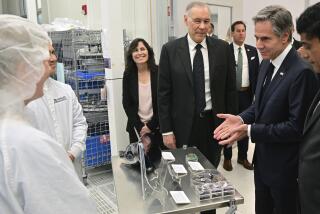Hitachi Opens Research Center at UCI
- Share via
IRVINE — Hitachi Ltd. opened the first Japanese research laboratory at the heart of a U.S. university with great fanfare Monday at UC Irvine as company officials downplayed concerns that the firm may try to walk off with research secrets.
“It’s my long-term principle that any facility should contribute to the local community,” said Dr. Ryoji Yokoyama, president of Tokyo-based Hitachi Chemical Co. Ltd. He said critics should not be concerned that Hitachi will take away research discoveries made at the laboratory, called Plumwood House. Instead, Hitachi hopes to enrich the medical school’s basic research program, he said.
Kiyohiko Arafune, Japan’s consul general in Los Angeles, tried to appease U.S. fears of a Japanese encroachment at U.S. universities by adding that the Hitachi lab is part of a trend toward the globalization of business. He said the facility could serve as a model of future joint efforts between Japanese companies and American universities.
“I can assure you that there’s no ulterior motive in building this research center,” Arafune said. “Japan wants to become more international in doing business. The Japanese companies are learning and want to give back to the American community.”
But such assurances have not convinced UCI students like Michael DeGroot, a medical student who said he’s concerned that the interests of students may be forgotten.
“I’m wondering if this lab will serve the general research needs of the UCI medical faculty or the business interests of Hitachi,” he said. “Some students have not thought about what effects this center could have on them. But there are others who concur with my opinion.”
UCI officials said that Plumwood House should have no effect on medical students and that UCI faculty members involved with the facility will not be distracted from other research work. Instead, UCI officials view the Hitachi facility as an incentive for the UCI academic community to learn from the Japanese about how to convert basic research into commercial products.
“One of the things that American universities have not been very effective at is transferring technology or basic discoveries to the commercial sector,” said Wesley Hatfield, a UCI professor of microbiology and molecular genetics.
Hatfield, who is also director of the Corporate-University Partners Program that oversees UCI’s relationship with industry, said his real concern is not whether the Japanese will commercialize discoveries made in Plumwood House, but rather on its effect on faculty members.
“I don’t believe the danger is that the Japanese will steal secrets from the university,” he said. “The danger would be that the faculty will get involved in commercial activity that would compromise their academic responsibilities to publish their work,” he said.
“We have always encouraged faculty entrepreneurship because, basically, most of the research done at UCI is funded by taxpayers,” Hatfield said. “We have the obligation and responsibility to transfer their basic discoveries to industry so that the discoveries can be manufactured for the public good.”
Plumwood House will concentrate on biochemistry research, a field in which Hitachi admittedly lags, Yokoyama said.
More to Read
Inside the business of entertainment
The Wide Shot brings you news, analysis and insights on everything from streaming wars to production — and what it all means for the future.
You may occasionally receive promotional content from the Los Angeles Times.










